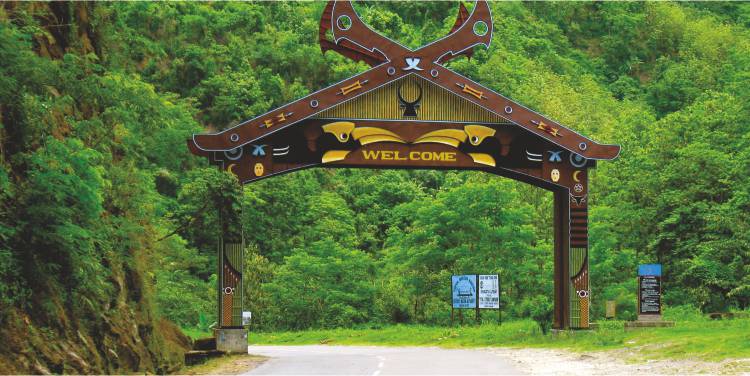In a history of sorts, a Christian majority (nominal or otherwise) state elected to power a party allied with the BJP, surprising and shocking many across the country.
I don’t mean to add to the rhetoric of fear and loathing. Even the BJP needs to be redeemed with the Gospel, and not hated like a leper. Also, in all fairness it must be pointed out that the apex Nagaland Baptist Church Council (NBCC) had launched a “clean election” campaign a year back and various church leaders have been quite outspoken in the media too. But that was not enough to change the outcome though perhaps it enabled a few to vote with their conscience. The election results forces us to ponder upon few questions. First, what has brought about this state of affairs? To call Nagaland a failed state would not be wrong. Despite the people being exempted from the Income Tax and state budget well provided for by the Central government, it has not translated into an efficient government enabling a high standard of living for the people. Second, why has the church in Nagaland not been able to raise Godly leaders despite Christianity being the de facto faith of the people for nearly a century and a half? And lastly, can we do anything about it?
Everyone knows democracy is a numbers game but not many are aware of its presuppositions. A democratic polity assumes a well-educated informed citizenry who’ll think beyond affiliations of caste/clan/tribe/community, and in turn will vote for that leader whose vision and promise is to secure the best for all.
When it comes to religious piety, the Naga Christians are second to none. They can fast as much and pray as long and sincerely as anyone else can.
It also presupposes citizens who’ll not be easily swayed by narrow or populist rhetoric, nor sell their vote for money or other personal gains. At some point of time some societies which had been shaped by Biblical values came close to this ideal but clearly this was not manifest in the recent election in Christian Nagaland. K K Sema, a spotless man of proven integrity who retired as an IAS officer – perhaps the most qualified among all the contestants, was not even elected. Everyone could see that despite the call for clean elections, it was money and muscle power all the way.
I asked what has brought this state of affairs in the opening. Herein, I will attempt to sketch a few answers which I hope will initiate discussion among readers including those from outside Nagaland. I’d merely taken Nagaland as my ruse; the questions and proposed solutions are applicable across all states.
First, the basic theology of Naga Christians and Indian Christians need a thorough revision. When it comes to religious piety, the Naga Christians are second to none. They can fast as much and pray as long and sincerely as anyone else can. But the whole orientation of the Christian message has always been mainly about personal salvation understood in terms of going to heaven when we die. Life on earth is merely time pass until Jesus comes or we go to heaven. The emphasis of the church has been mostly about being born again and less on discipleship. And even where discipleship is sometimes discussed, it’s mainly about being a good moral Christian. I may be wrong but so far I have not come across any church which teaches its members, especially the youth to question the given, to question why things are the way they are, to question and explore the implication of the Kingdom of God breaking forth in Nagaland. I can go on but suffice for now to say, Nagaland churches need to develop a robust Theology of Work and a Theology of Mission understood as being stewards of God’s Earth. There is no good theologian or pastor who can help the average Naga engineer or doctor or civil servant struggling with work place ethics.
We cannot afford to be not strategic in directing our youth to be adventurous and explore their God – given potential.
Second, Naga society mirrors the wider Indian society in valorising the Civil Services over almost everything a youth can aspire for. Ajay Singh Yadav, a former bureaucrat who resigned from the IAS to explore other important things of life advised disenchanted (by the present India) dreamy-eyed youth wanting to make the country better to not go for the Civil Services but rather join politics. If politics have been sadly reserved for the moneyed- shrewd-crooked of our society, is it any surprise that the kind of government we get is this! How can we expect our state to be first world when we elect people of third – rate character to govern us? When we send only the worst students especially 2nd/3rd divisioners and dropouts for theological studies, how can we expect them to give us a robust Theology of Governance and speak Truth to Power? As much as we need first – rate politicians of the stature of say a Lee Kuan Yew, we need first – rate theologians too who’ll remind the people of God’s purpose for a Government and God’s desire for ‘a just governance’. When the society, be it Naga or Manipuri or Tripuri prime its best youth for a career in either Politics or Theology/Pastoral Ministry, its second best to the Civil Services or Engineering/Medical/Law, can we expect a new force for change which will transform Nagaland or Manipur as basket cases of state failure to a paradise like Singapore. The definitive Protestant understanding of the Doctrine of Calling and Work need to be retrieved. We cannot afford to be not strategic in directing our youth to be adventurous and explore their God – given potential. They have to be nurtured to think beyond job-security as salaried lecturers or doctors.
Lastly, the Churches in Nagaland being organised along tribal lines for convenience’s sake itself reinforces the evil hold of tribalism even in politics. Prayers for election often becomes prayer for electing ‘someone from my tribe/clan’. The idea behind being that we need someone from our community to protect our interests. Herein, Nagaland Baptist Church Council (NBCC) should encourage existing multi-ethnic churches and positively seek out to create more churches where dividing walls of hostility between different communities is being broken down (Eph. 2:14), and where loving neighbours is not misunderstood to mean loving people from our own ethnic community (parable of the good Samaritan). The church must strive to create a society in which authentic democracy can blossom.
In effect, the election is a reminder and a clarion call for the Church in Nagaland to be a true Church of Jesus Christ.





